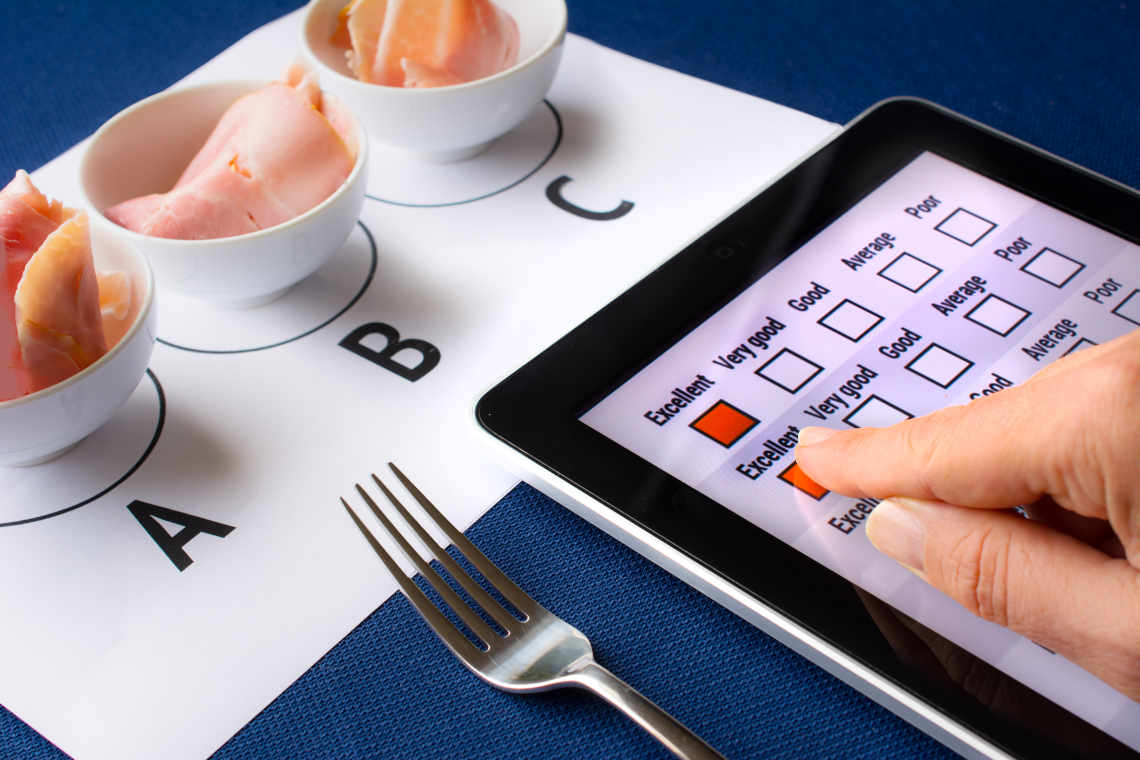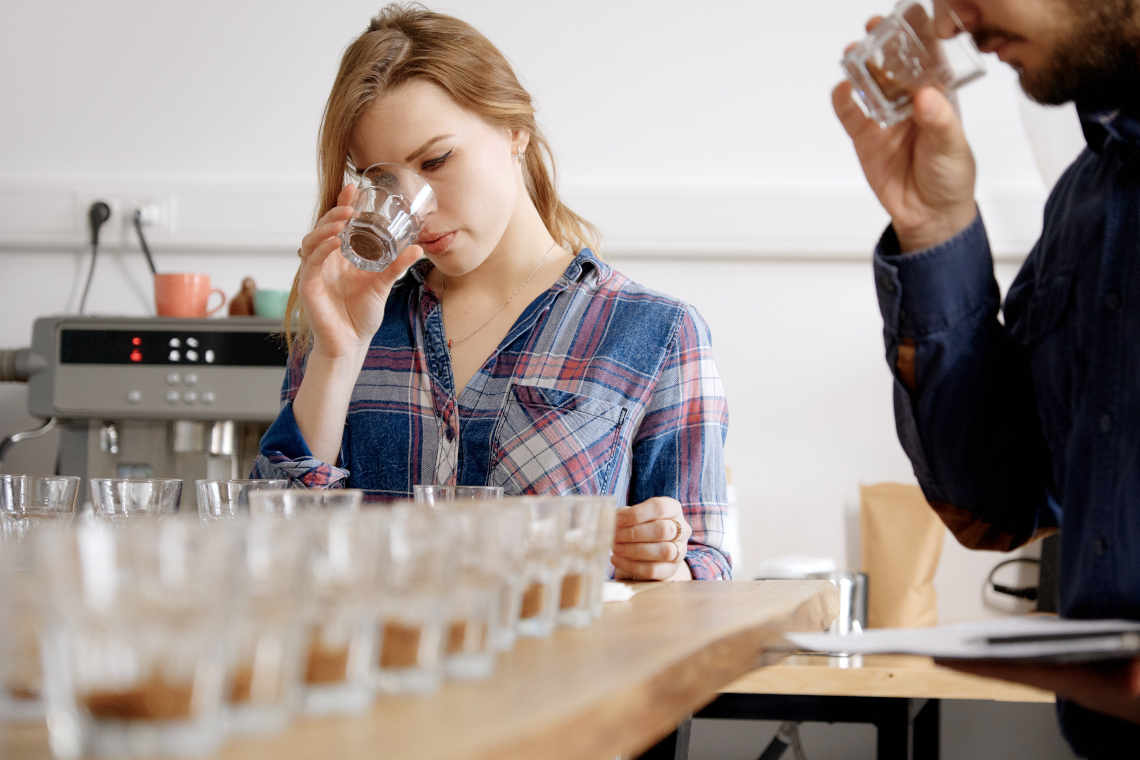Product Taste Testing

Gathering consumer feedback allows companies to improve their products’ chances of success and build stronger relationships with their target audience.
Have you ever wondered what makes a product stand out in a crowded market? In today’s hypercompetitive business landscape, the answer often lies in the meticulous process of taste testing. This essential practice ensures that a product meets the highest standards of quality and taste and plays a crucial role in shaping consumer preferences and driving brand loyalty.
What is Product Taste Testing?
Product taste testing helps businesses understand consumer preferences and improve their products’ market appeal. This testing involves gathering feedback from consumers who sample and evaluate a product’s taste, texture, aroma, and overall sensory experience. Through taste testing, companies can gather valuable insights into how the target market perceives their products – and this feedback can help them identify strengths and weaknesses, refine the product formulation, and make informed decisions about packaging, pricing, and marketing strategies.
When consumers receive products for tasting, the test usually covers all sensory dimensions. These include:
- Mouth Feel
- Appearance
- Aroma (odor)
- Aftertaste
- Texture
Why is Product Taste Testing Important?

Performing a taste test is essential. It helps businesses to understand how their product will perform. It gives them an insight into the minds of the target consumer group. Product taste testing also tells them what their target customers think of their product.
With the right insights, companies can anticipate market trends and consumer preferences, allowing them to tailor their product offerings to meet current demands and stay ahead of competitors. Testing can also help businesses identify emerging opportunities and potential threats, enabling them to make informed decisions and adjust their strategies accordingly.
Key Job Titles
- Chief Product Officer (CPO)
- Individual Donors
- Advisor
- Analyst
- Design Consultant
- Design Engineer
- Engineer
- Owner
- Product Specialist
- Technician
- VP Product Management
- Product Manager
- Director of Product Management
Who Uses Product Taste Testing
Food and beverage companies are among the primary users of taste testing research, relying on it to ensure that their products meet consumer expectations for flavor, texture, and overall appeal. By conducting taste tests, these companies can gather valuable feedback that informs their product formulation and quality control processes, ultimately leading to products that resonate with their target market.
Marketing teams within these companies leverage taste-testing data to craft messaging and campaigns highlighting their products’ unique flavors and qualities. Understanding consumer preferences allows them to tailor their marketing efforts to better resonate with their audience, driving sales and brand loyalty.
Research and development (R&D) departments play a crucial role in taste testing, using consumer feedback to refine existing products and develop new ones. By analyzing taste test results, R&D teams can identify trends, preferences, and areas for improvement, guiding their innovation efforts and ensuring that they deliver products that meet consumer expectations.
Quality assurance (QA) teams also rely on taste testing to maintain product consistency and quality. By regularly conducting taste tests, QA teams can identify product flavor or quality issues early on, allowing them to take corrective action and uphold the brand’s reputation for excellence.
Retailers use taste testing to select products that align with their target market’s preferences and drive store sales. By offering taste tests to customers, retailers can increase product visibility and encourage trial, ultimately leading to higher sales and customer satisfaction.
Key Success Factors
Brands have access to three standard testing methods. Using at least one of these methods will ensure the success of product taste testing. These include:
- Comparative Testing: Participants view two or more products simultaneously in the comparative test. They try them all at first and then state which one they prefer.
- Triangle Testing: Brands use this method to find differences. In other words, participants taste three products. Two are the same, and one is different. Then, after tasting all three products, the tester asks them which one is odd.
- Monadic Testing: The Monadic test involves showing each participant a single product. Then, they ask them for their reactions.
Other success factors are:
- Competitive benchmarking
- Zero outside influence.
- Cost-efficiency
- The separation of the evaluation of products from experiences in real-life
- Clarifying whether the participants like or dislike the product
Expected Results from SIS International’s Product Taste Testing

SIS International offers comprehensive product taste testing services tailored to businesses’ unique needs and objectives across various industries. We deliver actionable insights and tangible results that drive product excellence and market success through rigorous methodology, expert sensory panels, and advanced data analysis techniques.
- Enhanced Product Acceptance: By leveraging SIS International’s services, businesses can gain valuable insights into consumer preferences, flavor profiles, and sensory experiences.
- Improved Market Differentiation: Our product taste services enable businesses to identify unique flavor profiles, textures, or sensory attributes that set their products apart.
- Informed Decision-Making: SIS’s data-driven approach to product taste testing empowers businesses to make informed strategic decisions across the product development lifecycle.
- Mitigated Risk of Product Failure: Utilizing SIS International’s testing expertise allows businesses to proactively mitigate the risks associated with product failure or market rejection.
Opportunities For Businesses
Product taste testing presents businesses with many opportunities to gain a competitive edge, optimize their offerings, and foster consumer satisfaction.
- Product Optimization and Innovation: Taste testing serves as a catalyst for product optimization and innovation, enabling businesses to refine their formulations, experiment with new flavors, and introduce novel product concepts.
- Market Differentiation and Brand Positioning: Leveraging taste testing insights allows businesses to differentiate their products in crowded marketplaces and establish a compelling brand position based on sensory excellence.
- Enhanced Marketing and Messaging: Taste testing data provides businesses with compelling marketing content and messaging that resonates with consumers’ sensory preferences.
- Continuous Improvement and Adaptation: Embracing taste testing as an ongoing process allows businesses to continuously improve their products, adapt to changing consumer preferences, and maintain relevance in dynamic markets.
How SIS International’s Product Taste Testing Helps Businesses
SIS’s product taste testing services are tailored to meet the specific needs of businesses seeking to optimize their offerings, drive consumer satisfaction, and gain a competitive edge in the market.
- Comprehensive Testing Methodology: SIS International employs a comprehensive testing methodology encompassing qualitative and quantitative approaches to gather meaningful insights into consumer preferences and sensory experiences.
- Expert Sensory Panels: Our sensory panels consist of trained experts with extensive experience evaluating food, beverage, and consumer goods across diverse categories.
- Advanced Data Analysis Techniques: At SIS International, we employ advanced data analysis techniques to derive actionable insights from taste testing data. From statistical analysis to qualitative coding and trend identification, our analysts leverage cutting-edge methodologies to uncover patterns, correlations, and opportunities for optimization.
- Customized Solutions for Every Need: SIS International offers customized solutions tailored to each client’s unique needs and objectives. Whether conducting exploratory taste testing for new product development or evaluating existing products for optimization, our team collaborates closely with businesses to design research protocols that deliver maximum value and impact.
Our Facility Location in New York
11 E 22nd Street, Floor 2, New York, NY 10010 T: +1(212) 505-6805
About SIS International
SIS International offers Quantitative, Qualitative, and Strategy Research. We provide data, tools, strategies, reports, and insights for decision-making. We also conduct interviews, surveys, focus groups, and other Market Research methods and approaches. Contact us for your next Market Research project.

